Step-by-Step Guide to Launching a Profitable Food Truck Business in Seattle, WA
Learn how to start a food truck business in Seattle, WA with this step wise guide. Covers licenses, permits, equipment, staffing, and where to buy your truck.
Tauseeq Magsi
loading...

Seattle has temporarily waived street-permit fees for food trucks, a savings of $4,296 per year!
Step-by-Step Guide to Starting a Food Truck Business in Seattle
Step 1: Develop Your Business Plan and Choose Your Business Structure
Step 2: Secure All Required Permits and Licenses
Step 3: Find and Choose the Right Food Truck for Your Seattle Business
Step 4: Secure Funding for Your Seattle Food Truck Business
Step 5: Build Your Food Truck Crew for Seattle Success
How to Choose and Use a Commissary Kitchen for Your Seattle Food Truck
Managing Waste and Trash Disposal for Your Seattle Food Truck
Seattle’s streets are packed with flavor, and the Seattle food truck industry is one of the most active in the Pacific Northwest.
From busy lunch crowds in South Lake Union to weekend festivals on the waterfront, the city offers plenty of high-traffic spots where a well-run truck can thrive.
With certain vending fees waiveduntil early 2026, there’s a unique chance to reduce startup costs and hit the ground running.
Success here comes down to preparation. Navigating permits, securing a prime location, finding the right vehicle, and organizing your crew all require a clear plan.
This guide breaks down the process step-by-step, with links to official forms, current fees, and trusted marketplaces where you can find a food truck for sale Seattle WA, or browse food trucks for sale in Seattle Washington.
By following this checklist, you can move from planning to your first sale with confidence, avoiding the delays and guesswork that slow down many new ventures in the food trucks Seattle market.
Why Seattle as a Market? (top)
Seattle’s mobile dining scene stands out and here’s a clear reason why it’s worth paying attention.
As part of its Downtown Activation Plan, the city has waived street-permit fees for food trucks and food carts through 1 January 2026. That waiver can save a single truck up to $4,296 per year in permit costs, lowering one of the main barriers to entry in the food trucks Seattle market.
That financial break makes Seattle more accessible for people launching a Seattle food truck. At the same time, opportunity comes with its own challenges. Vendors still need to navigate parking logistics, tight health and fire code regulations, and fierce competition over the best locations to set up and sell.
Despite these challenges, demand for mobile food remains strong. Seattle’s active street culture and bustling markets offer peaks of foot traffic especially around business districts and weekend events. If you plan carefully, understand the local rules, and pick the right spots, this market can deliver real opportunity for growth.
Step-by-Step Guide to Starting a Food Truck Business in Seattle (top)
Launching a Seattle food truck takes more than just great recipes, it requires careful planning, legal setup, and smart decision-making from the very beginning.
Follow these steps in order to move from an idea to a fully operational truck in the Seattle food truck market.
Step 1: Develop Your Business Plan and Choose Your Business Structure (top)
Your first task is to map out the vision for your business and decide how it will be structured legally.
Start by outlining your concept in detail. What type of food you’ll serve, your menu size, pricing strategy, target customers, hours of operation, and the service style you’ll use. Be realistic about costs and revenue projections, and include a budget that covers equipment, permits, insurance, staffing, and marketing.
Setting aside 2–4 weeks for this stage will give you enough time to gather research, crunch numbers, and refine your plan.
Once your concept is clear, choose a legal structure.
In Washington, your main options are Sole Proprietorship (simple setup, full personal liability), Limited Liability Company (LLC) (liability protection with flexible taxes), or Corporation (strong liability protection with more formalities and potential double taxation).
Many food truck owners choose an LLC for liability protection, but each structure has its own tax implications and paperwork requirements.
✅ Sole Proprietor: The simplest form, where you and the business are the same legally.
✅ Limited Liability Company (LLC): A separate legal entity that protects your personal assets.
✅ Corporation: A more complex structure, taxed separately from its owners.
✅ Sole Proprietorship
To register this business structure in the state of Washington, begin by visiting the Washington State Department of Revenue website and using their Business Licensing Wizard
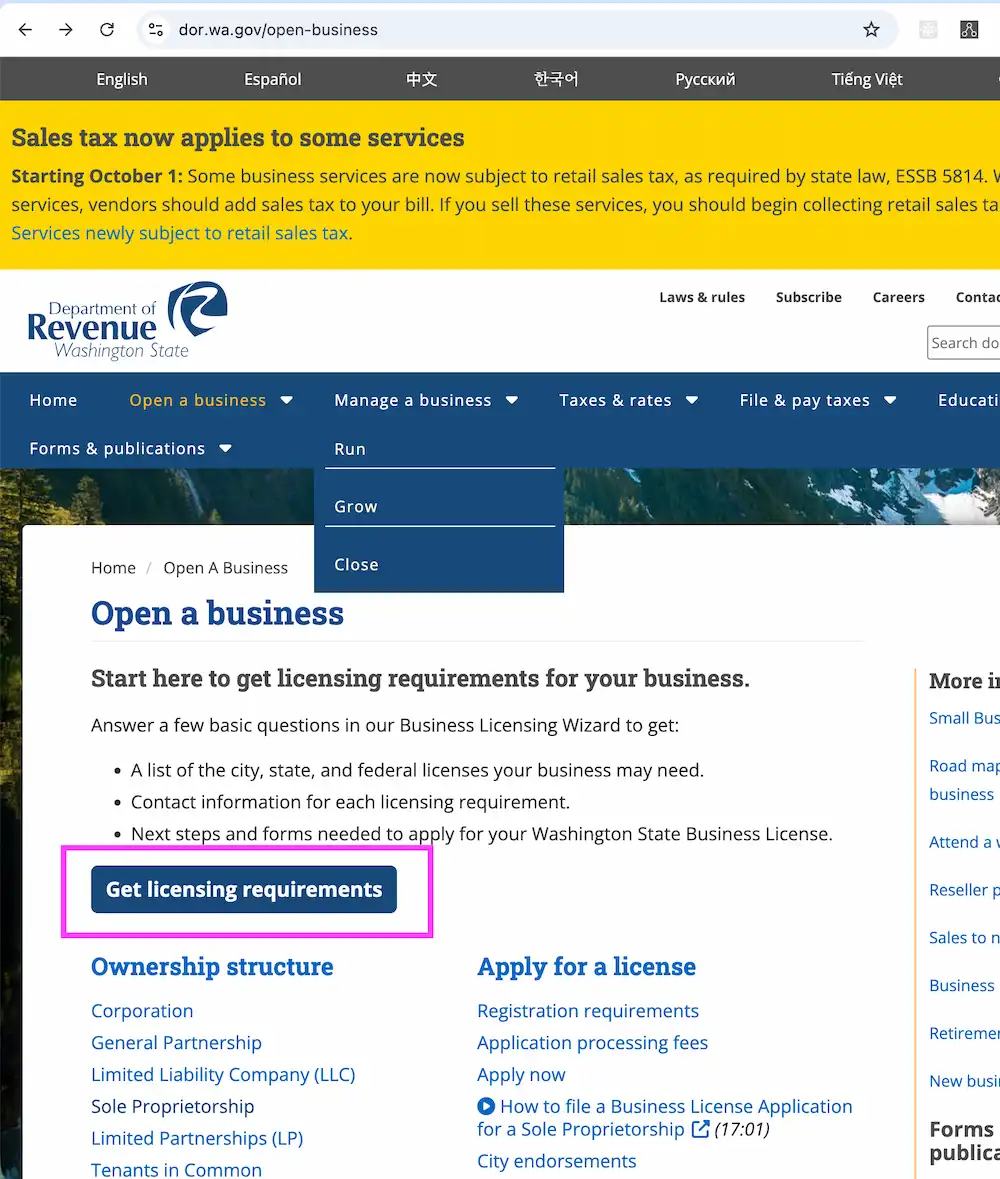
Click the Get licensing requirements to start the wizard.
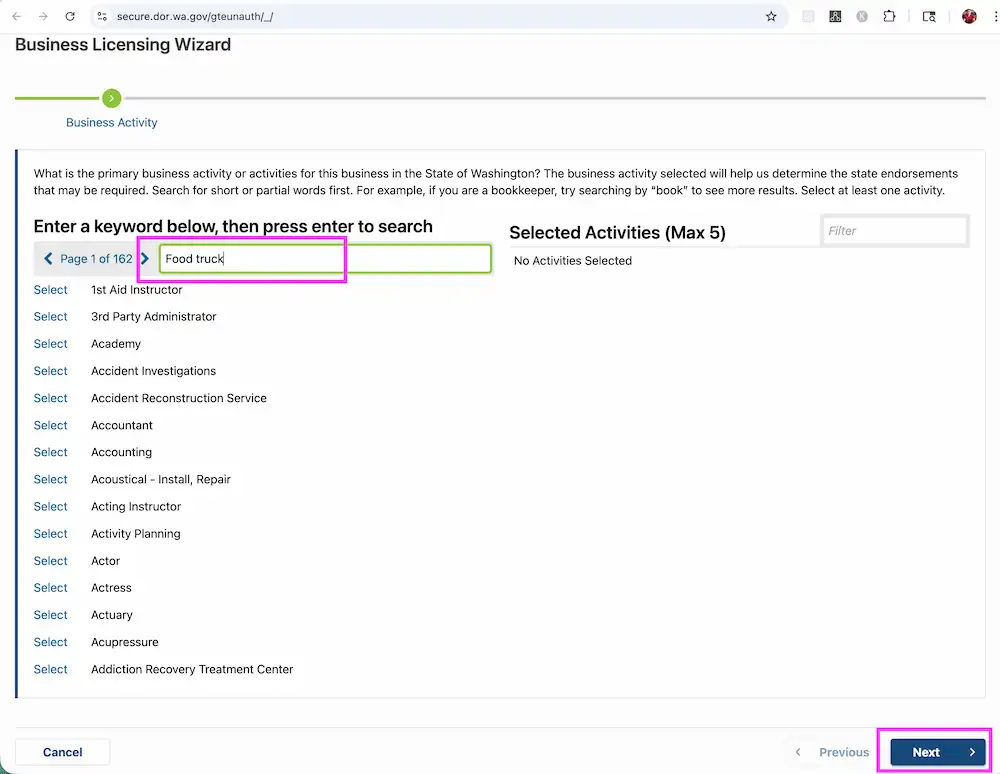
Click the food truck in the search field and then then click the Next button at the bottom of the interface.
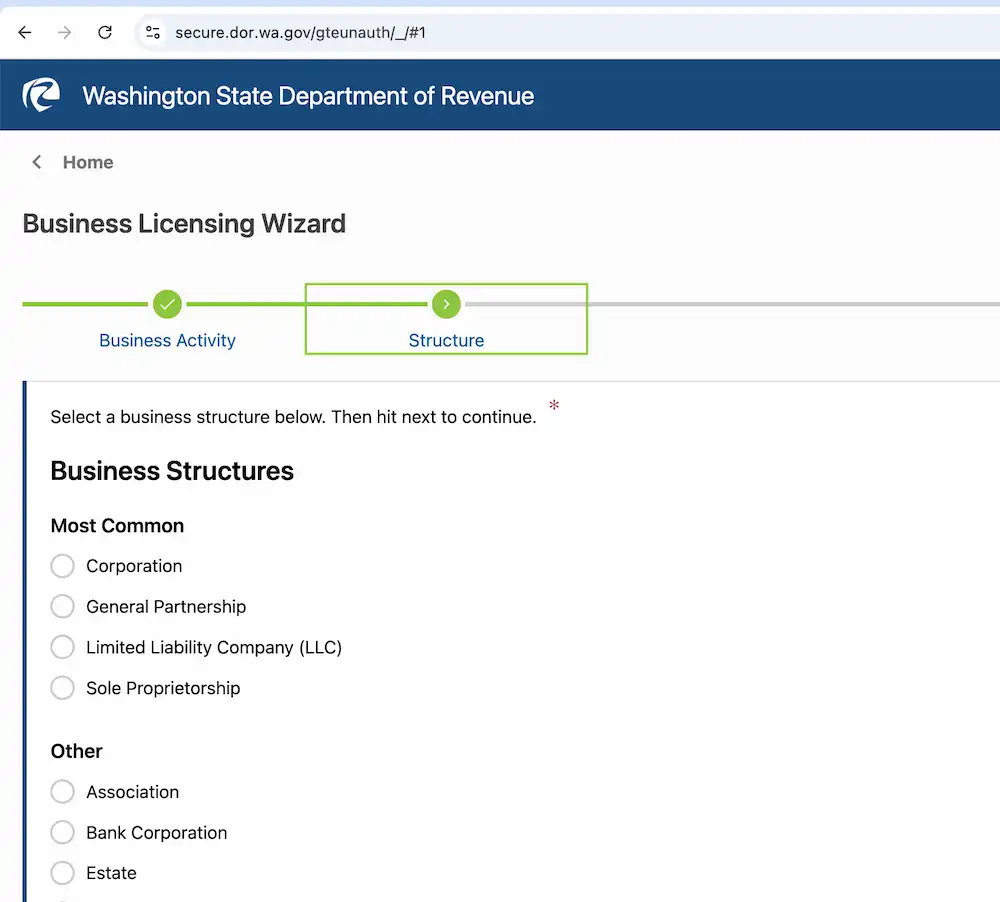
Lastly, select one of the business structures and then click the Next button at the bottom of the interface.
✅ Limited Liability Company (LLC)
A Limited Liability Company (LLC) is registered through the Washington Secretary of State. Information on how to file online, the curent fees, and other requirements can be found at Washington Secretary of State LLC & PLLC Filing Resource Page
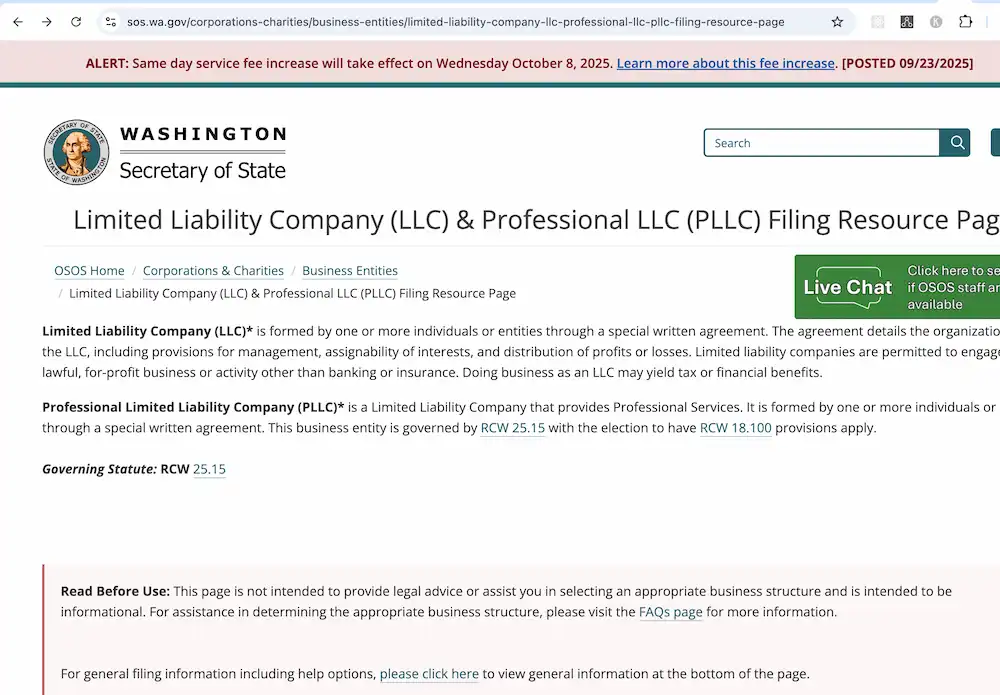
Use the Limited Liability Company (LLC) & Professional LLC (PLLC) Filing Resource Page to begin the process of registering your LLC with the state of Washington.
✅ Corporation
Corporations are also registered through the Washington Secretary of State. This is done through a dedicated online portal referred to as the “Corporations & Charities Filing System” (CCFS) and can be accessed here at https://ccfs.sos.wa.gov/#/. Create a user account to use the system and follow the steps as presented.
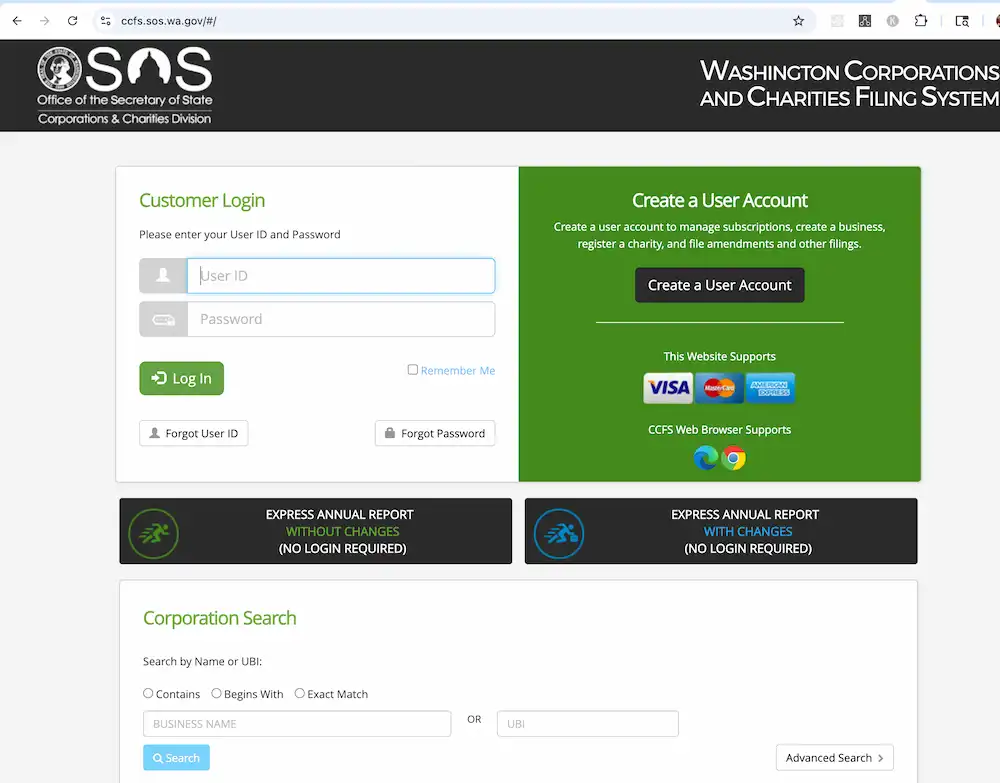
If you wish to form a corporation, visit the Corporations & Charities Filing System (CCFS) page to begin the process of registering your corporation with the state of Washington.
After registering either your Sole Proprietorship, LLC or corporation, you’ll need to then get an Employer Identification Number (EIN) IRS website. This is free and necessary for tax and payroll purposes.
Applying for an EIN is free and easy. Visit the IRS website to review the steps. Then apply online. Once you submit the form, you'll get your EIN immediately.
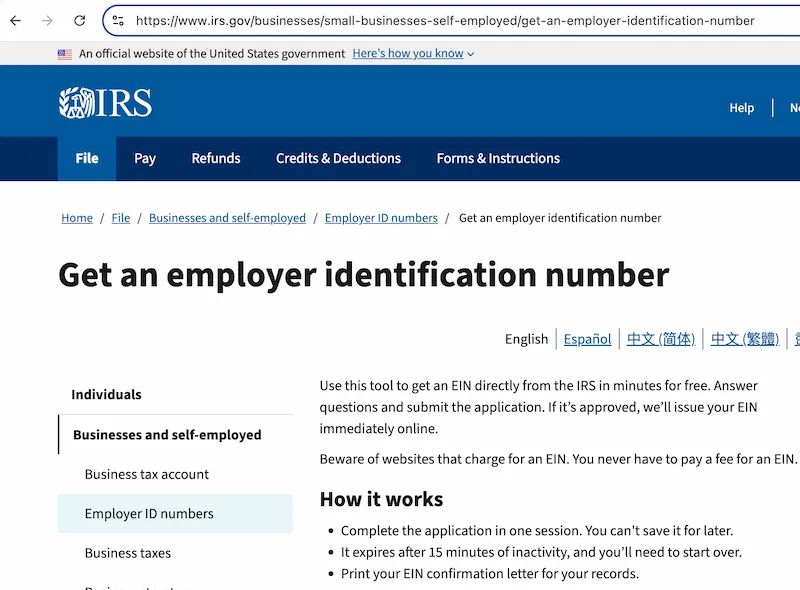
Apply online for an EIN at https://sa.www4.irs.gov/applyein/.
What You Need
Have your business name, address, and the responsible party’s Social Security Number ready when applying.
After completing all of the requirements in this first step with Washington state and the IRS, the legal foundation for your food truck business will be in place. You can then move on to the next step of getting the necessary permits and licenses to operate in Seattle.
Getting this first step right ensures you’re legally compliant and financially organized before you start investing in equipment or permits.
Step 2: Secure All Required Permits and Licenses (top)
Before you start serving food from your Seattle food truck, it’s crucial to obtain all the necessary permits and licenses. This process involves several layers of government and specific documentation, but handling it early will keep you on track and avoid costly delays.
1. Mobile Food Business Permit (King County)
The Mobile Food Business Permit is mandatory for all mobile food units in Seattle, including food trucks, carts, and trailers.
This permit is issued by King County Public Health and ensures your operation meets health and safety standards.
To apply, you’ll need to submit detailed plans along with supporting documents. These include a Use of Commissary Agreement (which we will discuss later in detail), which verifies the commercial kitchen or facility where you’ll prepare and store your food, and a Restroom Agreement confirming access to appropriate restroom facilities for your staff.
Additionally, a Mobile Questionnaire about your operational details and menu is required.
Applications are submitted through the King County online portal and you can view the steps at their mobile food plan review page. Be prepared for a plan review period of 10 weeks. Permit fees vary depending on your menu complexity and risk category, so it’s important to review the mobile food plan review page for the most accurate and up-to-date rates.
2. City of Seattle Business License
Every food truck business operating within Seattle city limits must obtain a business license. This license legally registers your business and allows you to collect and report city taxes. You can apply for this license via the FileLocal, which is a government run website.
The annual fee for most small businesses, including food trucks, has a range of $71 to $3,126. This fee is based on your business's gross revenue / projected revenue.
Make note that you'll need to renew this license annually and keep it current to avoid penalties. Business licenses expire on 31 December each year.
3. Seattle Fire Department Permit
If your food truck uses propane (LPG) or other cooking equipment that involves open flames or generates significant heat, you will need a permit from the Seattle Fire Department. This permit confirms your truck meets all fire safety regulations and passes the required inspections.
The permit application is submitted through the Seattle Fire Marshal’s Office, and as of 2025, the fee is approximately $422 annually. Securing this permit is non-negotiable for ensuring safety for you, your staff, and your customers.
4. Street Use Vending Permit (Seattle Department of Transportation - SDOT)
To operate on public streets, sidewalks, or plazas, you must obtain a Street Use Vending Permit from Seattle’s Department of Transportation. This permit grants you legal permission to sell food in designated public areas.
The good news is that as part of the Downtown Activation Plan, Seattle has waived vending permit fees through 1 January 2026, significantly reducing startup expenses.
You can apply for this permit on the SDOT website, and even though the fee is waived currently, it’s important to secure the permit to comply with city regulations and avoid fines.
5. Washington State Food Worker Card
All employees who handle food in your operation must have a valid Washington State Food Worker Card. This card certifies that they have completed the necessary food safety training mandated by the state.
The card costs about $10 per person and is valid for 2 to 3 years depending on renewal status. Your staff must obtain this card before starting work on your food truck.
Training and card applications are conveniently handled online through the Washington State Food Worker Card program.
Step 3: Find and Choose the Right Food Truck for Your Seattle Business (top)
Finding the right vehicle is key to your Seattle food truck success. You can either buy or lease a truck.
For those searching for a food truck for sale Seattle or food trucks for sale in Seattle Washington , trusted sites like UsedFoodTrucks.com, BizBuySell, and the Mobile Food Alliance offer a range of options—from older trucks starting around $25,000 to fully equipped ones costing over $100,000.
Some listings include permits and prime locations, which can save time but usually cost more.
Leasing is an alternative to reduce upfront costs but may limit your flexibility.
Always inspect the truck thoroughly or hire a professional before buying to ensure it meets health, safety, and mechanical standards.
Choosing the right truck sets the foundation for your success in the food trucks Seattle market.
Step 4: Secure Funding for Your Seattle Food Truck Business (top)
Starting a Seattle food truck requires upfront capital, so securing the right funding is essential. Many entrepreneurs use a mix of personal savings, small business loans, and alternative financing options to get started.
Traditional small business loans from banks or credit unions can provide a lump sum with reasonable interest rates. To qualify, you’ll need a solid business plan and good credit. The U.S. Small Business Administration (SBA)also offers loan programs designed to help startups, which might be worth exploring.
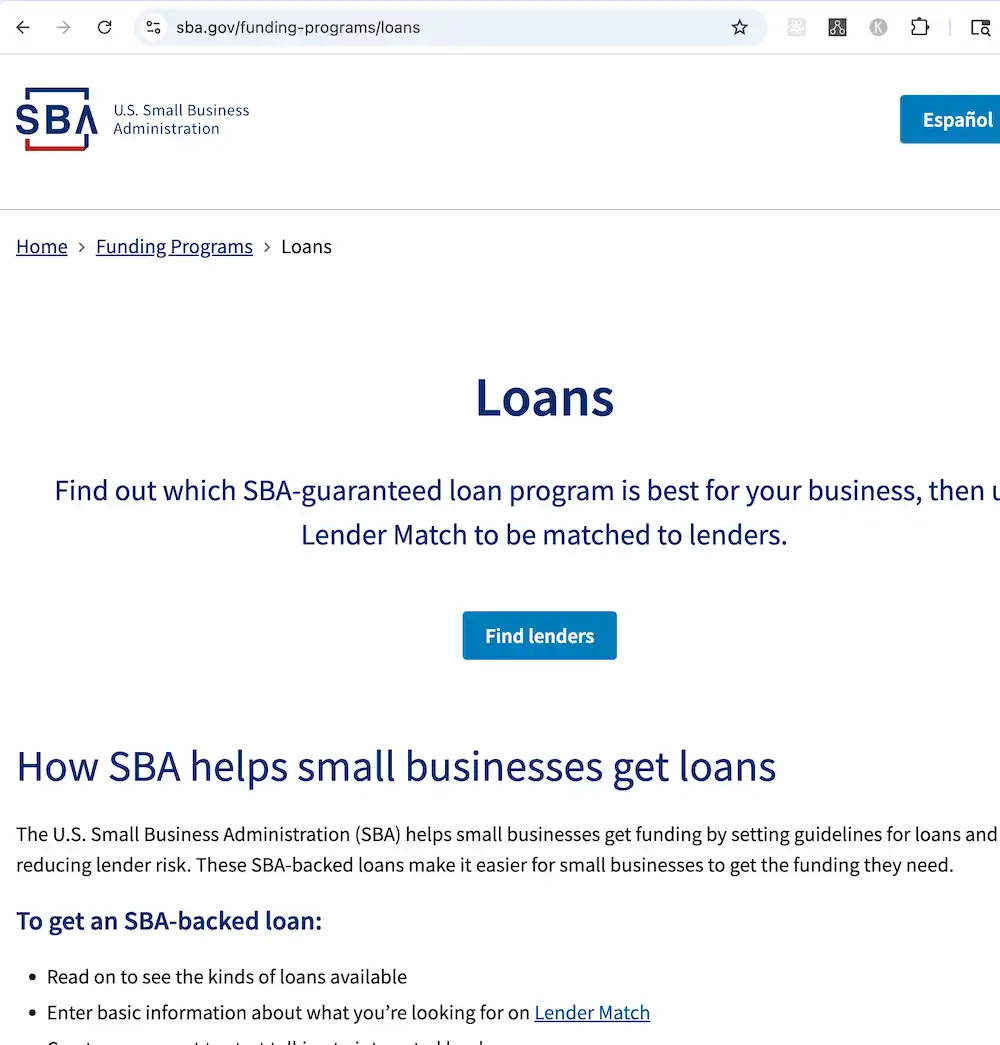
Visit the SBA website to explore loan options and application details. https://www.sba.gov/funding-programs/loans.
If loans aren’t an option, consider crowdfunding platforms or peer-to-peer lending sites that connect you with investors willing to fund your truck. Some local community development financial institutions (CDFIs) in Washington offer grants or low-interest loans specifically for small food businesses.
Leasing equipment and trucks can also reduce your initial expenses, freeing up capital for other needs.
Before taking on debt, carefully calculate your expected costs and revenue to ensure you can comfortably manage repayments. Solid financial planning here will keep your food trucks Seattle business on steady footing.
Step 5: Build Your Food Truck Crew for Seattle Success (top)
Staffing your Seattle food truck efficiently is key to smooth daily operations and great customer service. At minimum, you’ll need one person to handle cooking and food prep, and another to take orders, serve customers, and manage payments.
Many small food trucks operate with just these two roles, especially during busy lunch hours or weekend events. If your menu is more complex or you plan to operate long hours, consider adding an extra cook or a dedicated cashier to reduce wait times and maintain quality.
Keep in mind that all food handlers must have a valid Washington State Food Worker Card. Cross-training staff on multiple roles can improve flexibility during busy times or if someone is unavailable.
Hiring local workers familiar with Seattle’s food scene and regulations can be a bonus. Staffing correctly from the start helps you maintain efficiency, control labor costs, and deliver a consistent customer experience in the competitive food trucks Seattle market.
Pro Tip: Apply for your permits in parallel rather than one at a time. Some approvals require others to already be in place, so starting them together can shave weeks off your launch timeline.
How to Choose and Use a Commissary Kitchen for Your Seattle Food Truck (top)
One of the essential but often overlooked parts of running a Seattle food truck is securing access to a commissary kitchen. This is a licensed commercial kitchen where you can safely prepare, store, and sometimes clean your equipment.
Seattle health regulationsrequire food trucks to operate in conjunction with an approved commissary. This ensures that food is prepared in a sanitary environment, waste is properly handled, and trucks have a place to restock and clean daily.
Commissary kitchens often offer additional services like storage for supplies, waste disposal, and access to water and electricity hookups. Many food truck owners rent space in shared commissaries, which can be more cost-effective than building your own kitchen.
Before signing a lease, visit the commissary to verify it meets all King County health requirements, and check if it fits your schedule and operational needs. A good commissary partnership can streamline your day-to-day tasks and keep your truck compliant with local health codes.
Managing Waste and Trash Disposal for Your Seattle Food Truck (top)
Proper waste management is an important part of running a Seattle food truck smoothly and staying compliant with local regulations. Food trucks generate a significant amount of trash and grease waste daily, so having a reliable system in place is essential.
Most food trucks establish a relationship with a local waste disposal service or commissary that accepts their trash and grease. Many commissaries provide scheduled trash pick-up and grease disposal services, which simplifies compliance with city health and environmental codes.
If your commissary does not offer waste services, you'll need to arrange for a licensed commercial waste hauler who can handle both solid waste and grease trap pumping. It's important to avoid dumping waste illegally, as Seattle enforces strict penalties to protect public health and the environment.
Make sure your truck is equipped with separate bins for recyclable materials, compostables, and landfill waste, as Seattle encourages waste sorting and recycling. Planning ahead for daily trash removal and grease disposal will help you avoid fines and keep your operation running cleanly and efficiently.
Water System Requirements for Your Seattle Food Truck (top)
Your food truck needs a properly designedwater system to meet health standards and keep operations running smoothly. This includes a hand wash sink that provides hot and cold water, enough for employees to wash both hands at once. The fresh water tank and all hoses must be made from food-safe materials and filled from approved sources.
The wastewater tank must be larger than the fresh water tank by at least 15% and should have a secure, leak-free connection for easy emptying. Wastewater must be dumped only at approved locations like commissaries or designated disposal sites, not on streets or landscaping.
If your truck includes a three-compartment sink for dishwashing, it needs hot and cold running water and space on either side for cleaning dishes.
Finally, if you offer seating for customers, a public restroom must be located within 500 feet of your truck.
Final Thoughts (top)
By following this comprehensive food trucks Seattle checklist, from securing permits and licenses to buying your truck, assembling your crew, and managing waste—you’ll be well-prepared to launch your business.
Stay organized, start the process early, and take advantage of fee waivers and local resources whenever possible.
By staying organized and proactive throughout each step, you can confidently navigate the Seattle food truck market and find the perfect vehicle among food trucks for sale Seattle listings.
Leveraging local resources and opportunities like fee waivers will give you a valuable edge as you move forward.
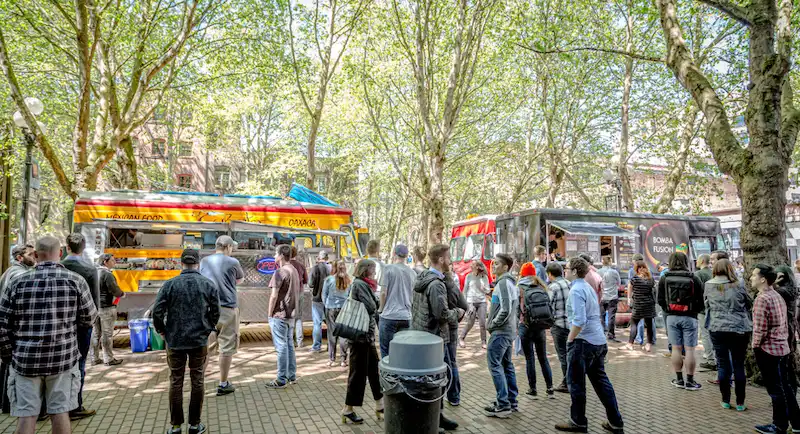
We ❤️ Seattle, Washington!
©2025 Cocina Digital Hospitality Group, Inc. All rights reserved.
No part of this publication may be reproduced, stored in a retrieval system, or transmitted in any form or by any means, electronic, mechanical, photocopying, recording, or otherwise, without the prior written permission of the publisher.
We use cookies to enable you to use our site, understand how you use our site, and improve your overall experience.
Cookies allow us to personalize content, track which pages are most popular and least popular, and provide advertising that may be relevant to you.
Please note that cookies that are essential to the proper functioning of the site are required and cannot be disabled.
They are usually only set in response to actions made by you which amount to remembering your settings, a request for services, such as setting your privacy preferences, logging in, or filling in forms.
As such, they are the only cookies that are enabled by default.
You can set your browser to block or alert you about these cookies.
By continuing to use our site, you accept our use of cookies.